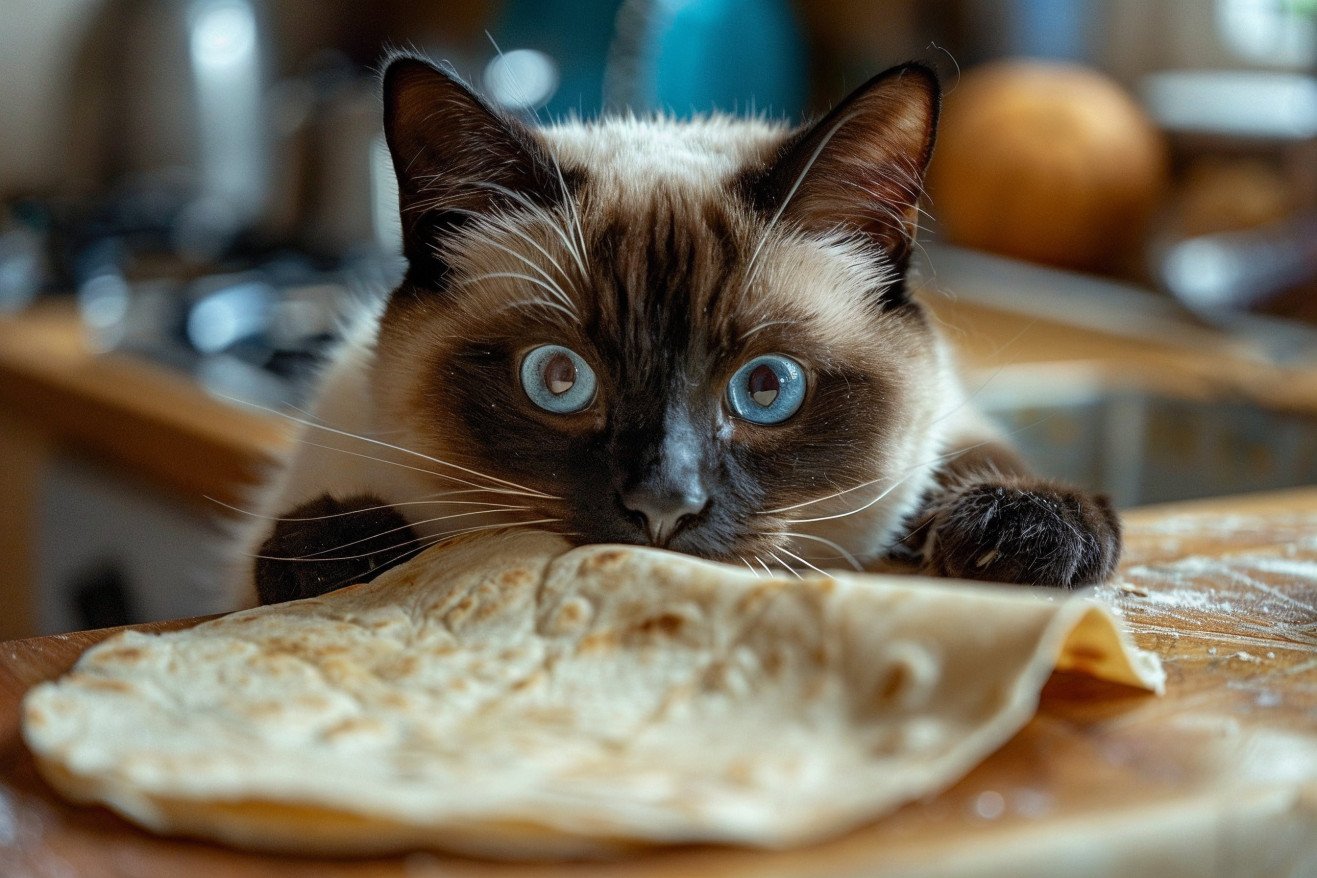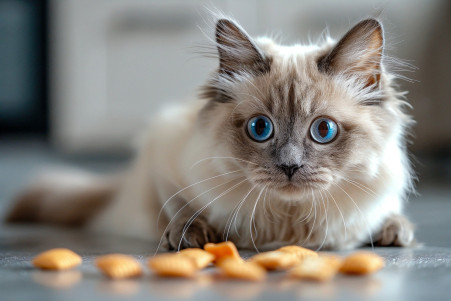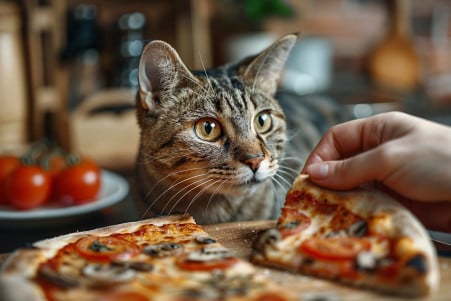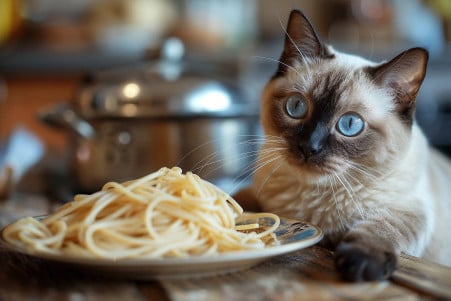Can Cats Have Tortillas? What You Need to Know
11 May 2024 • Updated 11 May 2024

If you’ve ever been eating a burrito and your cat comes up to you begging for a bite, you may have wondered whether or not it’s safe to share your tortilla with your pet. While it’s not toxic for cats to eat plain tortillas in small amounts, tortillas don’t offer any nutritional benefits for obligate carnivores like cats. Plus, they’re high in carbohydrates, which cats have a hard time digesting, so they’re not the best choice for a treat and could potentially lead to digestive issues.
However, while plain tortillas aren’t poisonous to cats, things get a little more complicated when you consider the other ingredients that are often used to make tortillas and the different types of tortillas that are available. This article will take a look at what the science says about cats and tortillas to help you better understand the potential risks and benefits of sharing this human food with your cat. In the process, you’ll learn which tortilla ingredients and types are safe to share, which ones you should avoid, and how to make sure your cat is eating a healthy, species-appropriate diet.
Can cats eat tortillas?
Understanding a Cat's Nutritional Needs as an Obligate Carnivore
Cats are obligate carnivores, which means that their bodies have evolved to get the nutrients they need from animal-based proteins and fats. Because they are obligate carnivores, plant-based foods like tortillas do not contain the necessary nutrients for cats to thrive. In fact, according to Purina, cats need a diet that is high in animal protein, moderate in fat, and low in carbohydrates.
If cats are fed too many carbs, it can lead to obesity, feline diabetes, and other health issues that their bodies are not well-equipped to manage. While there are some human foods that cats can eat in small amounts as treats, cats should primarily eat formulated cat food that is made to meet their specific nutritional needs.
It's also worth noting that kittens have different nutritional needs than adult cats, especially when they are in their growth and development stages. Pawlicy Advisor suggests that kittens should be fed kitten food as their main diet and that approved human foods like cooked eggs or meat should be introduced slowly and in small amounts. This makes it especially important to ensure that cats are getting a balanced, species-appropriate diet at every stage of life.
Risks of Giving Tortillas to Cats
While cats can have a small amount of plain tortilla, there are a few risks to keep in mind. Tortillas are often high in sodium, saturated fats, and preservatives, all of which can be harmful to cats. Hepper even says that one tortilla can contain almost 10 times the amount of sodium a cat should have in a day.
In addition, the high carbohydrate content in tortillas can lead to obesity and diabetes in cats. Catster explains that while processed corn can be a good source of quick energy, it should not replace a cat's protein-based diet, especially since cats are obligate carnivores.
Some of the ingredients in tortillas, such as onions, garlic, and some spices, can be toxic to cats. Modern Vet also says that corn and wheat in tortillas can cause food allergies or sensitivities in some cats. In addition, cats don't have the enzymes needed to break down the starches and gluten in flour tortillas.
Symptoms of Dietary Issues and Toxicity in Cats
Gastrointestinal symptoms like vomiting, diarrhea, and loss of appetite may be a sign of dietary issues like intolerance or allergies to certain ingredients in tortillas, according to 10 Human Foods That Can Harm Your Cat. Meanwhile, more serious symptoms such as weakness, lethargy, and neurological symptoms may be a sign of toxicity from ingredients like onions, garlic, or certain spices found in tortillas, according to VCA Animal Hospitals.
Other symptoms like increased thirst, increased urination, and changes in weight may be a sign of an underlying health condition like feline diabetes, which can be made worse by a high-carb diet that includes tortillas. The VCA Animal Hospitals guide also notes that skin problems, difficulty breathing, and seizures are all signs of toxicity that require immediate medical attention.
It's important to watch a cat closely for any changes in behavior or health when introducing new foods, as Meowbox points out. If any symptoms of illness or toxicity develop, it's important to seek medical help for a cat right away.
Emergency Care and First Aid for Poisoned Cats
If a cat has eaten something that you suspect is poisonous, like tortilla ingredients, it's important to get veterinary help immediately. According to wikiHow, the first thing you should do is get the cat out of the area and into a well-lit, well-ventilated room. From there, call your vet or a pet poison control hotline right away, as they will be able to give you the most accurate information on what to do.
The wikiHow article also says that you should not induce vomiting unless you are told to do so by a medical professional because it can make things worse in some cases. That said, WagWalking explains that activated charcoal may be recommended to help reduce absorption of the toxin.
In the meantime, it's important to make sure that your cat is comfortable and to watch them closely until you can get them to the vet. It's important to make sure that you are following the advice of a professional, as trying to treat poisoning at home without a vet's help can be dangerous. The most important thing is to act quickly and stay calm and informed in the event of a cat poisoning emergency.
How to Keep Cats Away From Human Foods
Never feed your cat from the table or give them your leftovers, as this will only encourage them to beg for more, says Pets Stack Exchange. Instead, make sure human foods are stored in a place that's inaccessible to cats and that counters and tables are free of anything that might tempt them.
To keep cats away from human foods, BeChewy suggests using deterrents like double-sided tape or motion-activated devices to keep cats off of surfaces. You can also satisfy a cat's natural foraging instincts by offering them approved treats or food puzzles.
It's important to consistently work with your cat to make sure they have the right behaviors when it comes to human food, notes Orange County, NC, so make sure to use positive reinforcement and patience to teach your cat that the kitchen counter and dining table are not places they should visit.
By making sure to limit access and work to change your cat's behavior, you can help make sure your cat doesn't consume tortillas or other human foods that could be dangerous to them.
Conclusion: How to Feed Cats a Balanced, Species-Appropriate Diet
While plain tortillas are not toxic to cats in small amounts, they are not nutritionally beneficial to cats. Cats are obligate carnivores and need a diet that is high in animal-based proteins and fats. This means that plant-based foods like tortillas do not contain the essential nutrients that cats need to thrive. In fact, feeding cats too many carbohydrates can lead to obesity, diabetes, and other health problems.
In addition, some of the ingredients used to make tortillas, such as onions or excessive salt, can be toxic to cats. In addition, corn and wheat, which are often found in tortillas, can cause food allergies or sensitivities in some cats. Furthermore, cats do not have the enzymes necessary to properly digest the starches and gluten found in flour tortillas.
If your cat eats tortillas, signs of gastrointestinal upset or toxicity may include vomiting, diarrhea, and lethargy. If you notice these symptoms, contact your veterinarian. If your cat is having trouble breathing, contact your vet immediately or take your cat to the nearest animal hospital.
To avoid issues, never feed your cat from the table and use deterrents to keep your cat off of surfaces where human food is prepared or eaten. Instead, you can offer your cat alternative treats that are safe for them to eat.


